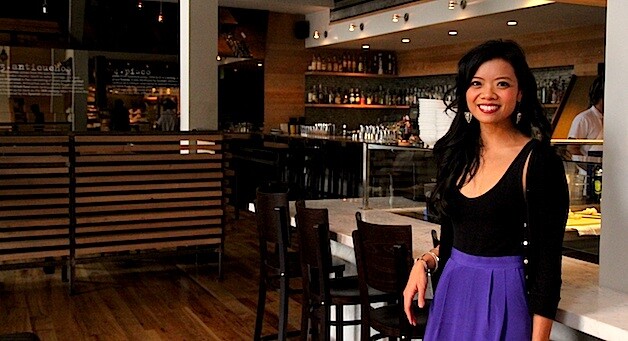Food Jobs: Restaurant Manager

KCET sat down with Lien Ta, the manager at Picca restaurant, where chef Ricardo Zarate and managing partner Stephane Bombet create new Peruvian cuisine with a Japanese twist. Lien's path to management wasn't a direct one, but it was certainly creative.
Christianna: How did you get your start in the restaurant industry?
Lien: I graduated from Emerson College in 2003 with a degree in literature and publishing, came to Los Angeles and landed a job as an entertainment reporter. In 2009, I started to burn out on it. It wasn't my passion. I took a couple of weeks off, went to Vietnam to visit family and immersed myself in the food culture there. I came back and thought, "I've always loved dinner!" and started working on a path to get into food. I started a Twitter account and followed every food feed out there, just to get to know the community. I started eating out more, then I decided to go to wine school. After that, I completed a short externship in the kitchen at Lucques, then worked as a cocktail waitress at Tiki No, a bar in North Hollywood, and then began food writing. As a friend said, I began a systematic approach to learning all aspects of the restaurant world.
Christianna: How did this lead to the job you have now?
Lien: I was doing my daily research on food news as part of being a food writer, and I saw a tweet by the managing partner of Picca (Stephane Bombet) looking for someone to help them in an assistant role. I immediately called Picca and applied for the job. That was in July of 2011, and I started doing everything, from answering phones to helping with billing. Just a couple of months ago, Stephane asked if I wanted to manage Picca. I jumped at the chance. I just started fully managing the space in October.
Christianna: What does managing a restaurant involve?
Lien: Everything from invoicing, ordering beer, wine, food and supplies, creating sales projections and scheduling employees to expediting plates from the kitchen to the dining room and managing over 50 staff in the kitchen, bar and front dining room. Ideally, I spend the first part of my day in the office, and the rest of it on the floor with staff and guests. I never thought I would find myself worrying about the little things, but the details are key. What's the music in the dining room? What is the temperature of the dining room? I now think about every aspect of the dining experience, right down to the napkins.

Christianna : When diners visit Picca, what can they expect?
Lien: The food is playful and fun, but pretty. The ceviches are popular, and Chef Zarate, a native of Peru, has years of training in Japanese cuisine, so he brings each influence to the menu. We have things on the menu like sea urchin paella, duck leg confit with cilantro rice and beer sauce, and some adventurous things like beef heart anticuchos, traditional Peruvian skewered meats.
Christianna: What's your favorite part of the job?
Lien: It's got to be the hospitality, and of course, the food. I try to visit every table once an evening. We are modern casual dining with high expectations, but we have fun. We play salsa in the dining room and by the end of the night, we're hugging our diners. I think we're doing a good job at being Picca.
Christianna: Any words of advice for other people who think they want to dive into the food industry?
Lien: You have to figure out if you really want to do it. Get into the industry, anywhere you can, to try it and see. But mainly, you have to have a high level of endurance and commitment, and a real sense of passion for food. I loved entertainment reporting, but I wasn't impassioned by it. Now, I wake up in the morning and say, "What am I going to eat today?" And since then I kind of knew I wanted to get into the business.